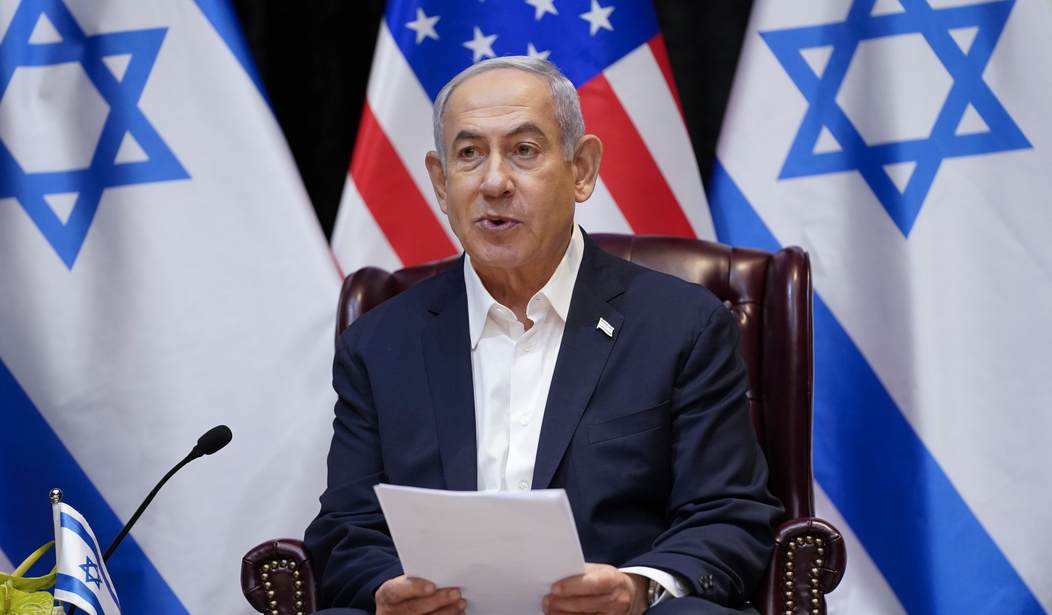The U.S. and its Arab allies in the Middle East are looking to negotiate a"phased diplomatic process" that would begin with the release of all remaining Israeli hostages.
Egypt and Qatar are also involved in the negotiations. But Hamas says there's been no real progress and Israeli Prime Minister Benjamin Netanyahu has indirectly nixed any deal with Hamas, saying that he “will not compromise on full Israeli control” over Gaza and that “this is contrary to a Palestinian state.”
Hamas will never agree to a release of the 100 remaining hostages without some quid pro quo about Gaza remaining in Palestinian hands.
Joe Biden is desperate for a peace breakthrough. His left wing is caving to cease-fire demands by Hamas while his own political fortunes need something spectacular to turn around his moribund campaign.
But Prime Minister Netanyahu has his own troubles. Thousands of protesters filled the streets of Tel Aviv calling for new elections while hundreds of members of hostage families protested outside his house.
And his own coalition is getting antsy.
But a member of Israel’s War Cabinet, former Israeli army chief Gadi Eisenkot, has called a cease-fire the only way to secure the hostages’ release, a comment that implied criticism of Israel’s current strategy.
Critics have accused Netanyahu of preventing a Cabinet-level debate about a post-war scenario for Gaza. They say he is stalling to prevent conflict within his coalition. Netanyahu’s office called the claim that he was unnecessarily prolonging the war “utter nonsense.”
Neither Israel nor Hamas has any real incentive to make a deal right now. Netanyahu made a promise that he would end the threat from Hamas while the terrorists won't let the hostages go until Israel releases thousands of Palestinian prisoners and makes certain concessions on Gaza remaining Palestinian.
There's certainly no foreseeable way to bridge that divide. Hamas is going to hold on to the hostages as tightly as they can and Israel is going to lay waste to Gaza.
On Tuesday in Cairo, Israeli negotiators offered another counterproposal on hostages that didn’t include a path to ending the war, Egyptian officials said. They said Egypt’s top negotiator, its intelligence chief, Abbas Kamel, accused Israel’s team of not being serious about the talks.
Meanwhile, Hamas has told Egyptian and Qatari officials that the previous, short-term hostage deal was unsatisfactory, with less aid than promised reaching Gaza and many of its freed prisoners getting arrested again later.
Hamas is under no pressure save what damage the IDF can inflict on them. For Netanyahu, however, the clock is indeed ticking. A critical mass is building in Israel, being fed by the families of hostages and uneasiness by at least some Israelis that the war is damaging Israel internationally and some kind of "off-ramp" should be found.
Only 9% of Israelis think they're "winning the war" according to the Maariv and Channel 12 news surveys. Those surveys also show a catastrophic decline in support for Netanyahu and Likud Party.
According to Maariv, the parties in Netanyahu’s pre-war coalition would win just 44 Knesset seats compared to the 64 they won in the November 2022 elections, and two less than a previous poll by the daily, while parties in the previous ruling coalition would win 71 seats in the 120-member Knesset.
Channel 12 placed parties loyal to Netanyahu at 48 seats, four more than its previous poll, and the former coalition at 67 seats.
Both surveys showed that Gantz’s party, which temporarily joined an emergency wartime government under Netanyahu to participate in critical decisions, would lead the largest party in the Knesset, with 39 seats according to Maariv, and 35 according to Channel 12, soaring from its current 12
Elections for the Knesset aren't likely to be held for a while given that Israel has a tradition of political differences being subsumed during wartime. But Netanyahu was already in political trouble prior to October 7 with his attempt to reform the judiciary and if he slips much lower in the polls, it's possible that new elections would be called.










